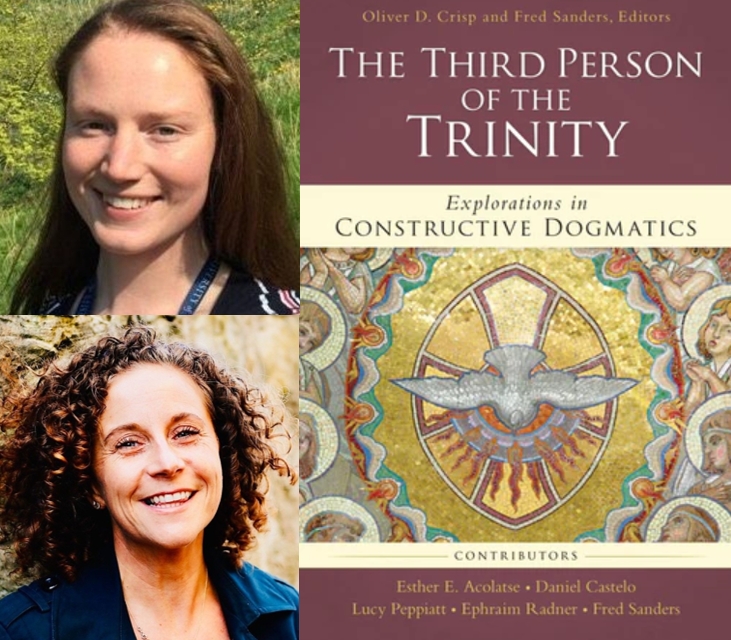
At least one chapter in The Third Person of the Trinity directly addresses how odd it is to call the Holy Spirit “third,” what we might mean by doing so, and in what sense doing so might signal a theological problem. That chapter is co-authored by Dr. Joanna Leidenhag and Dr. Kimberley Kroll, who decided to team up on the question when…. wait, I’m getting ahead of myself. Let’s have them explain it in their own words:
What’s your chapter in The Third Person of the Trinity about?
This chapter presents a roadmap for thinking about the Holy Spirit in Christian theology. There are different questions that a Christian can ask about the Holy Spirit, and these questions are different points of theological departure which often lead to very different destinations. The main questions of departure are the ‘what’ question and the ‘where’ question, i.e. what is Spirit? or where is Spirit?. However, we argue that these points of departure often take a wrong turn leading to either overly abstract and impersonal views of the Holy Spirit or lead to the Holy Spirit’s being lost in other doctrine. Instead, we suggest that the initial question that we should ask in pneumatology is: how does the mode of revelation of the Holy Spirit inform our understanding of what and who the Triune God is?
Why do you care about this topic?
It seems to us that the indwelling of the Holy Spirit is the current form in which God is most intimately and fully revealed in creation. And if this is so, the church and the academy should be thinking about it as a matter of upmost importance. Although the Spirit’s revelation always points to Christ, we think it is still the case that the means of revelation established at Pentecost is unique and needs to be attended to.
How does this chapter fit into your teaching or your writing?
Dr Leidenhag’s first publication was about the Holy Spirit in creation. Initially, she had wanted to pursue the topic of the Holy Spirit’s indwelling for her doctoral work. However, she found it very difficult to get a grip on the literature and the topic. And so, whilst the main thrust of her research moved in other directions she has continuously come back to the question; how should we think about the presence of God, the Holy Spirit?
Dr Kroll just successfully defended her PhD in September 2020 on the nature and relation of the indwelling Holy Spirit. She is now preparing this research for publication as a monograph. Given the dearth of literature on what Kroll calls “located presence of God,” she assumes that this is a topic she will be able to pursue throughout her scholarly career.
Where did the idea for this particular essay come from?
Dr Kroll and Dr Leidenhag kept running into one another at conferences around the UK and the US and debated why pneumatology was so hard but so important. Our first meeting was at the Logos Conference in St Andrews in 2017, where Dr Leidenhag encouraged Dr Kroll to write a paper on her frustrations regarding the way in which the Holy Spirit is often subordinated to the Father and the Son and appears to be less-than in both metaphysical category and revelatory importance. Two years later, Dr Leidenhag got a post at St Andrews, and LATC advertised the conference on the Third Person of the Trinity. We wrote the abstract immediately over coffee because we had been discussing these ideas for years.
What’s the next thing you’re working on, or looking forward to working on?
Again, Dr Kroll is preparing her PhD dissertation for publication. This includes the re-insertion of a chapter that was removed due to word limit. The chapter discusses exegetical methodology and how certain patterns of exegesis in Pauline studies have overlooked or minimized pneumatology. She is also working on the epistemology of discernment, given her understanding of the indwelling of the Holy Spirit in the Christian believer.
Dr Leidenhag is currently writing a primer (or manifesto) with Dr John Perry on what Science-Engaged Theology is and how theologians should employ scientific research within Christian teaching. She is also working towards a theological anthropology of autism.
Dr Kroll and Dr Leidenhag are also exploring the possibility of editing a volume together on the concept of special or located presence.
A bonus question not related to this book chapter: What’s the most stimulating thing you’ve read lately in theology?
Dr Kroll is currently teaching literature at The Stony Brook School, and so she has been reading Greek tragedies, Joyce, Shakespeare, and Dante. She recently read through Adonis Vidu’s upcoming monograph on divine missions. She found it to be a clear and concise text on divine missions while also adding a unique twist in how we might understand divine mission.
Dr Leidenhag is enjoying reading through Simeon Zahl’s The Holy Spirit and Christian Experience with some friends. Zahl’s book engages many of the same questions and issues that Dr Leidenhag is thinking through – both in this chapter on the third person of the Trinity, and in her work on how empirical studies should (and shouldn’t) be employed in theology such that theology is science-engaged.
For more sneak-peeks of The Third Person of the Trinity, check out our other interviews. You can pick up a copy of the book here.